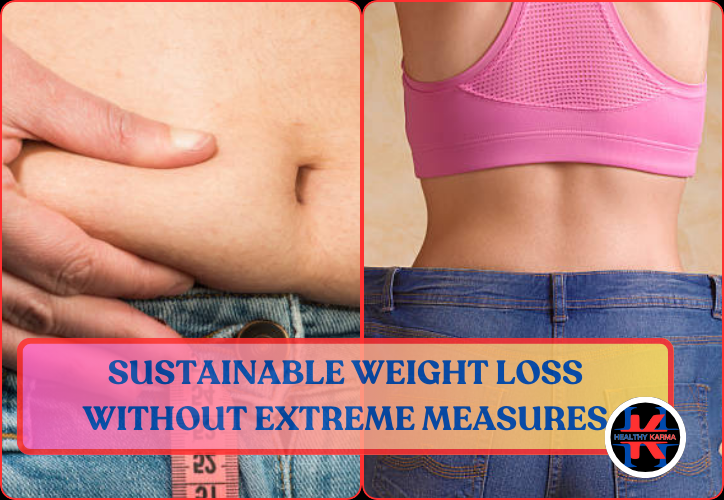

MASTERING WEIGHT LOSS: THE 7 EFFECTIVE SUSTAINABLE HABITS YOU NEED TO KNOW
When it comes to managing weight loss, the biggest challenge that emerges are the sustainable habits that you maintain for managing overall health and fitness levels in the body. Following crash diets and extreme workout routines might yield quick results, but they rarely lead to sustainable weight loss.
Even if you’re able to get the results, the withdrawal systems in the body reverse the same, and you’re back to where you are on your health goals. It’s like taking one step forward and two steps back. Here are some of the best weight-loss habits to keep in mind for sustaining success:
SUSTAINABLE HABIT # 1: Defining Your Desired Outcome: Setting Realistic Weight Loss Targets
One of the major reasons why most of us fail on the weight loss journey is that we are not clear on what we want. Setting realistic goals is crucial for sustainable weight loss. Sustainable weight loss changes take time and are the key to long-term success.
Keeping a reality check on the scale, losing 1-2 pounds per week, and keeping it that way by creating a set of sustainable habits would be more efficient than losing 70 pounds at once as mentioned in the ad about the latest fad diet plan that you have recently subscribed.
Even though you may have managed to achieve the desired results, your efforts would come to naught, without developing a set of sustainable habits, as the weight that you have lost would come back on once you are off the diet plan. This is due to the natural withdrawal symptoms that are generated by the body to make up for the deficiency in the nutrients created due to the restrictions in the diet plan.
sustainable habit # 2: Exploring the Basics of nutrition: macro & micronutrients
The body’s energy requirements are met through the various nutrients that are present in the food that we eat as part of the diet. Therefore, dietary habits play an important role in the management of a healthy lifestyle on a sustainable basis.
Contrary to popular belief, cutting out entire food groups to reduce the calorie intake in the body and severely restricting your calorie intake through fad diets might yield short-term results, but not in the long term.
Focusing on eating a variety of nutrient-dense foods through a balanced diet is a healthy lifestyle habit to follow. Incorporating all the food groups that contain all the nutrients like fruits, vegetables, lean proteins, whole grains, and healthy fats in a balanced proportion ensures that your body gets the essential nutrients at the same time controlling your calorie intake, without having to take the extra efforts.
sustainable habit # 3: Overcoming Emotional Eating: Using Mindfulness to Address Triggers and Cravings
For a moment, close your eyes and picture this: you’re about to dive into a plate loaded with your favourite foods. What happens to your senses? Feasting on the vibrant hues and the colours, your eyes glow and your mouth starts watering, and you attack the plate with all fervour.
One of the most common mistakes that stalls weight loss results is overeating, even healthy foods. Therefore, watching what you eat and how much you eat, in terms of portion, makes a lot of difference. Creating conscious awareness about what you’re eating and how much you’re eating as part of your diet plan is more effective than subscribing to fad diets and enrolling for expensive gym plans. Incorporating a sense of mindfulness by developing a set of sustainable habits for the diet plan certainly gives an edge to the weight loss efforts.
Practicing mindful eating with sustainable habits involves paying conscious attention to what you’re eating, savouring each bite by using all the senses in the body and paying attention to your body’s hunger and fullness cues. Apart from that, small, yet effective sustainable habits like using small serving bowls and plates, consciously taking small multiple servings instead of one large serving, etc. can not only help prevent overeating, at the same time save on food wastage.
RELATED: YOU MAY ALSO LIKE

Gut Feelings On The Plate: The Science Of Emotional Eating

the ultimate guide to resisting food temptations.
sustainable habit # 4: Finding Your Fitness Passion: Staying Active Beyond the Gym and staying motivated
Exercise – A word that makes most of us cringe and use lack of time as an excuse for the managing a healthy lifestyle. Find something that could be of interest and convert it into a workout whether its dancing, hiking, or even kickboxing. The key is to include a sense of fun as part of your lifestyle fun because, if your exercise feels like a chore, you won’t stick with it.
Exercise for the body isn’t just limited to burning calories in the body. It also affects your moods, reduces the stress levels in the body, and converts the body into a lean, and mean muscle machine. Keeping the body’s movement going, along with diet, is one of the important pillars of managing as healthy and sustainable lifestyle.
The American Heart Association, as a benchmark for a healthy lifestyle, recommends at least 150 minutes of moderate-intensity aerobic activity or 75 minutes of vigorous-intensity aerobic activity per week.
sustainable habit # 5: Incorporating Hydration Habits into Daily Routine: how water affects weight loss
The management of adequate hydration levels in the body is often overlooked as a weight loss strategy. The hydration level in the body, is an important pillar for managing weight loss and a healthy lifestyle on a sustainable basis.
Water levels in the body keeps the levels of metabolism in the body well lubricated, just like the level of oil in a machine. Hydration in the body sometimes also fool your brain into thinking that your body is full and you’re not feeling.
So, keep that glass of water ready to sip along with your favourite snack. Water not only helps control your appetite, support your metabolism, it also helps clear the digestive system by softening the hard waste in the body by softening the stools, making it easier to pass through the body and keeping the body’s systems clean.
So, before grabbing your favourite snack, grab your glass of water. The right combination of hydration and snacking is a winning combo to managing a healthy lifestyle the natural way. As a benchmark, the body needs at least 64 ounces of water daily to carry out its normal activities.
sustainable habit # 6: Establishing a Consistent Sleep Schedule: Importance of a sleep Routine for effective weight loss
Finally, don’t underestimate the power of sleep as part of a healthy lifestyle. When the body is well-rested, the body’s system increases it efficiency at burning fat levels in the body. So, get those Zzz’s like it’s a part of your job.
Weight loss magic happens when your body gets share of the rest and quality sleep. Getting quality sleep is essential for sustainable weight management in the body. Lack of sleep or poor levels of sleep can disrupt the level of hormones that regulate appetite in the body.
Unhealthy sleeping habits and eating habits lead to cravings for unhealthy foods and forms habits like unhealthy snacking. As part of a healthy lifestyle, the benchmark is 7-8 hours of quality sleep each night to keep the body in perfect running order and support your weight loss goals.
sustainable habit # 7: The Role of Friends Family and Peers in overcoming Weight Loss plateaus
Have you ever experienced the atmosphere of a crowd cheer their favourite team in a match? Having a strong and positive a support system or an accountability partner can be a game-changer in your health journey.
Whether it’s your best friend, a family member, or joining a weight loss group, sharing your health journey with others can provide motivation and encouragement to move forward. It’s easier to stay on track when you have someone cheering you on to achieve your goals.
Creating this sustainable habit as part of a healthy lifestyle not only helps achieve health goals faster, at the same time it creates a strong emotional support for managing your mental health in the long term, as the body ages due the natural body clock.
RELATED: YOU MAY ALSO LIKE

Sustainable Weight Loss Without Extreme Measures

Transform Your Body: Weight Loss Success For Beginners

Breaking Free From Weight Loss Plateaus
sustainable habit # 8: Understanding your current flight status on Your Weight Loss Journey
Keeping a track of your health activities, whether it is eating your meals, exercising, or your emotions can help understand the body in a better manner and identify those patterns that are giving results and not giving results.
This helps identify the blocks that are blocking the weight loss journey and make the necessary adjustments as part of a healthy lifestyle. Keeping a track on your progress can also provide the motivation to move faster on the weight loss journey as you see your achievements over time.
Remember that sustainable weight loss is a continuous journey, and not the destination. The idea is to make lasting changes to your lifestyle through a set of sustainable habits for the long term rather than relying on short-term fixes.
bonus tip: always follow the 80/20 rule
The 80/20 rule—working on your health gives results over the long term. Rather than overindulging in your favourite food now and regret later, after 10 years, eat clean and healthy 80% of the time today and enjoy your favourite indulgences 20% of the time. Balancing a healthy lifestyle, just like a cycling, is more about balance, rather than regretting by depriving your body of your favourite foods based on your latest fad diet plan.
If you’re following a healthy lifestyle, the next time that you are invited to your friend’s birthday or their wedding anniversary, go ahead and savour your favourite dessert without feeling guilty. Just remember that life is too short to say no to dessert! After all, you need to give yourself a break too!
conclusion
Let’s get one thing straight right – weight loss is like playing the elusive game of that treasure hunt where the “X” marks the spot. It’s a continuous journey, not a sprint. There is no finish line So, if you’re on a quest for sustainable weight loss, you’ll want to hang on till the time you hit the “X”, rather than quit the health game halfway in frustration.
Longevityand managing a healthy lifestyle is more than adopting short cuts and cheat sheets in the search for that elusive “X”. It’s more about building a set of sustainable habits that you can stick with for the long haul and keep hitting all the “X’s” that you encounter on the weight loss journey.